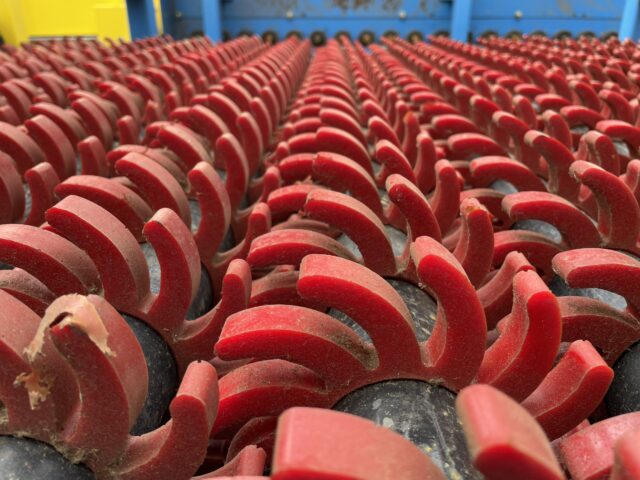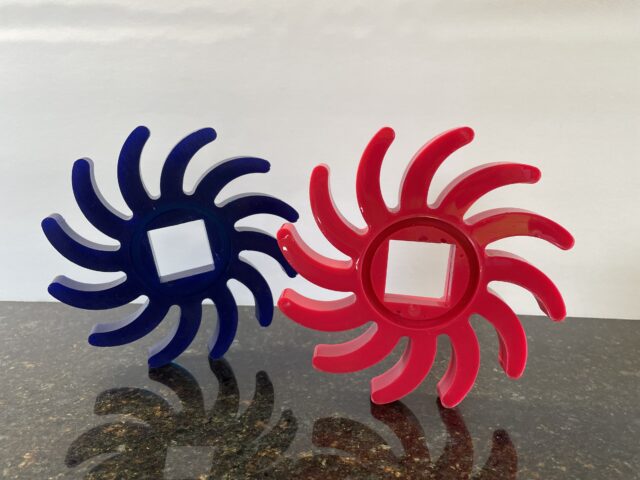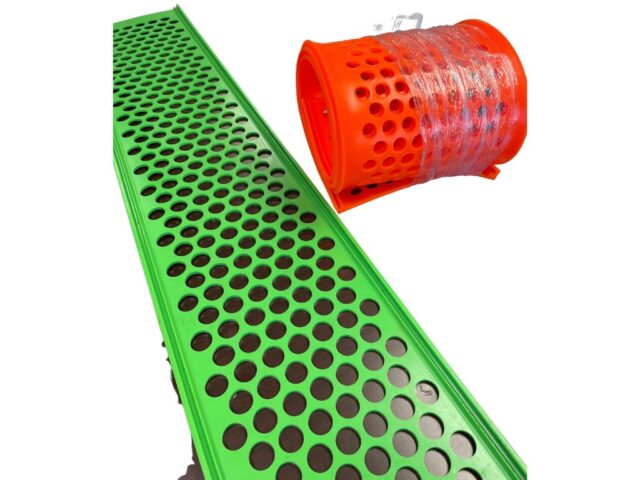
K2’s new line of recycling stars installed © K2 Castings
Our mantra has always been, “Wear Tough, Runs Long.” Whether times are tough or not, costs matter. We’re now bringing that same focus to plastic wear parts.
As the owner or operator, you’re constantly tasked with doing more with fewer people, stretching maintenance periods, and looking for the most competitive prices.
You also have to keep on top of trends and technology changes that improve efficiencies. With advances in single stream municipal recycling, larger scrap yards are now experimenting with roll screens for improved ferrous recovery.
Our customers in the recycling space are beginning to work with roll screens in sizing non-ferrous and fluff for the processing side of their operations. Roll screens have a major advantage due to their ease of adjustability in dealing with compressible products.
As with everything in metals recycling, adapting technologies used elsewhere has its drawbacks too.
What are roll screens – and how scrap yards are using them
Municipal waste facilities have used roll screens for several years to agitate and separate consumer recycling waste, construction debris, and even tires. Roll screens allow recyclers to efficiently sort high volumes of single stream waste material by type or size: Plastic bottles, cans, etc.
The set-up is pretty simple: The roll screen is part of the waste flow. Instead of a conveyor belt, the roll screen is comprised of perpendicular shafts and disks (sometimes referred to as “stars”).
The disk size, the rate they turn, and the openings between the shafts and disks determine the size of the material that falls through – while the rest is carried through for further sorting.
Most are set up on variable speed drives. This allows variability in the transfer speed of the flow of the sorted material below. Watch the brief video from Bulk Handling Systems to see a debris roll screen in action.
Municipal Recycling Facilities (MRFs) tend to use hard disk roll screens. They last long, don’t clog, and feature a precise hole size. Disks can be rubber or steel, triangular or another shape; variations are based on what they need to sort.
Composting materials are compressible materials and are best sorted on roll screens with plastic disks and staggered hole space designs. They tend to sit fairly flat and let the rolling ‘stars’ carry the material rather than rely on an angle of attack.

K2 Castings plastic recycling stars
Fluff and non-ferrous metals are well-suited to the throughput and compressibility of a compost roll screen. Agitation helps with sorting and avoids clogging; the variable speed helps tailor the split.
Potential benefits to scrap recyclers
As wet sortation makes its return to removing metals in the shredder downstream, roll screens are proving to be a useful tool.
The trend toward combining water sink/float and dry sorting eddy currents, induction sorters, and wire finders is promising. High throughput and VFD sizing flow help operators dial-in their sortation to a wet or dry system.
The complexity is offset by the incremental metal recovery.
However, the technology brings new maintenance challenges. For roll screens, plastic star disks will see a lot of abrasion as they move fluff and metals through. Good as they are at the task, the screens take on wear, like everything.
With testing, we’ve learned there’s a sweet spot to the flex, abrasion, and cut resistance needed. It’s not about material hardness – but about how tough it is. Give us a call, we can help.
Roll screens have the potential to provide metal recyclers with the huge win we’ve needed for years: a cleaner product that’s furnace-ready.
Instead of sending material overseas for processing, U.S. smelters can fabricate steel for use in U.S. aircraft, architecture, and industrial products – thus keeping recycling local and prices and supply relatively stable.
Add Plastic Stars from K2 Castings to your Roll Screens
K2 Castings’ new line of “runs tough” plastic stars will give you the extra weeks you need from your roll screens.
For those of you sizing with tried and true flexible shaker panels, we have a “runs tough, wears long” solution for you as well. Please inquire about replacement flex deck panels that stay on the job longer than most.

K2 Castings flex screens
Give us a call – 603-766-0423 – or email info@k2castings.com. We can help.



